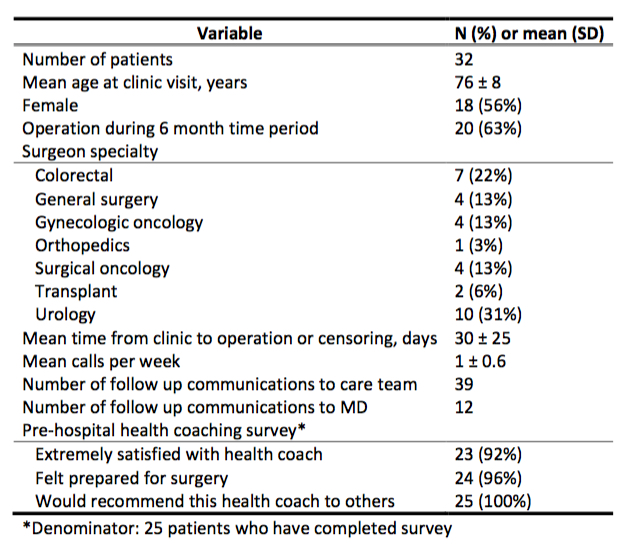J. Kaplan1, R. Hofer1, Z. Brinson1, P. Chung2, C. Lucas2, D. Teng3, V. Tang5, J. Broering4, A. Chang2,5, E. Finlayson1 1University Of California – San Francisco,Surgery,San Francisco, CA, USA 2University Of California – San Francisco,School Of Medicine,San Francisco, CA, USA 3University Of California – San Francisco,School Of Nursing,San Francisco, CA, USA 4University Of California – San Francisco,Urology,San Francisco, CA, USA 5University Of California – San Francisco,Geriatrics,San Francisco, CA, USA
Introduction: There are few opportunities for early learners to engage in authentic roles on health care teams. In a new geriatric optimization clinic for frail high-risk surgical patients, first year medical and nurse practitioner students were integrated into an interprofessional team as health coaches.
Methods: Frail surgical patients (those over the age of 80 or over the age of 60 with a geriatric syndrome) with planned elective operations were referred to a new geriatric pre-operative clinic to see a geriatrician, occupational therapist, physical therapist, and nutritionist. Students attended the entire clinic visit with the patient, reviewed the interdisciplinary care plan, attempted to call patients twice weekly preoperatively to promote adherence to care plans, and called weekly in the first month after discharge. They observed surgery and practiced physical exam and presentation skills during the inpatient stay. Students logged all calls and patients filled out health coach satisfaction surveys one week prior to surgery.
Results: In the 6 month pilot period, two first year medical students, one nurse practitioner student, and two research assistants served as health coaches for 32 patients. On average, there were 30 days between the clinic visit and surgery. Patient received an average of 1 call per week. There were 39 instances when health coaches contacted members of the care team, 12 of which were to contact a doctor. These follow up communications were for medication questions, concerning symptoms, or remaining questions from clinic visits. Overall patients were extremely satisfied with the health-coach experience, they felt better prepared for surgery, and would recommend the program to others.
Conclusions: Early medical and nurse practitioner students can serve the important function of health coaches for frail patients preparing for surgery. Students benefited from a unique longitudinal experience and gained skills in communication and care coordination.
